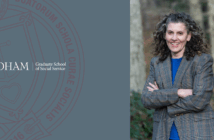Three Fordham GSS Community members have just co-authored research exploring burnout, compassion fatigue and satisfaction in New York Community Health Workers.
Associate Professor Abigail Ross, Ph.D.; Assistant Professor Rahbel Rahman, Ph.D.; and alumna Cassidy Rosenblatt, GSS ’22, all contributed on the study. The article, titled “Predictors of burnout, compassion fatigue, and compassion satisfaction experienced by community health workers offering maternal and infant services in New York State”, was published in the Journal of Community Psychology.
Abstract:
Although burnout has been increasingly well studied among medical (nurses, physicians, residents) and mental health providers (psychologists, psychiatrists, social workers), there continues to be a lack of attention on the well-being of community-based providers, such as Community Health Workers (CHWs), within the United States. Using cross-sectional data from 75 CHWs employed in 14 agencies funded through the Maternal and Infant Community Health Collaboratives Initiative (MICHC) in New York, our study examined predictors (anxiety, physical health, adverse childhood experiences, job satisfaction, role certainty, demographic and work characteristics) of burnout, compassion fatigue (CF) and compassion satisfaction (CS). Descriptive statistics were used to characterize our sample and linear regression was employed to investigate the correlates of burnout, CF and CS. Results indicated that CHWs with higher levels of anxiety and lower job satisfaction were more likely to have higher burnout scores. CHWs with higher levels of anxiety, lower job satisfaction and fewer days of poorer health were more likely to report higher CF. Those who worked more than 35 h per week were less likely to report higher CS. The study provides recommendations for organizational-level interventions to address risk factors of burnout and CF and promote CS among CHWs, such as bolstering supervision, encouraging greater communication, offering recognition/appreciation of CHWs and creating opportunities for self-care. Findings should be considered when designing organizational-level preventive measures that mitigate burnout and CF and promote CS.


